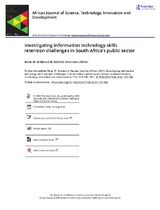Investigating information technology skills retention challenges in South Africa’s public sector
Abstract
South Africa’s democracy in 1994 triggered the promotion of socio-economic development in the public sector, with specific emphasis on improving infrastructure and bridging the information Technology (IT) skills gap. In this paper, the factors that influence the retention of competent IT resources for the State Information Technology Agency (SITA) are examined. The Theory of Planned Behaviour (TPB) is the underlying theoretical framework. A case study approach is employed as a suitable qualitative research design to investigate contemporary occurrences in real-life settings for exploratory and theory-building research. Empirical insights, regarding excessive power accumulation, lack of accountability, and skills imbalance, in state enterprises, are provided to manage IT infrastructure, effectively. The authors assert that reliance on consultants, promotes opportunistic bargaining that could be detrimental to the government’s strategy to retain skilled IT resources. The results reveal that recruiting and retaining appropriately skilled IT professionals, would address challenges of information asymmetry in the SITA, and facilitate the building of a strong professional network to manage the state enterprises’ IT platforms. The analyzed data emanate from the minutes of meetings, as well as published media sources, and validated by the project’s respondents. One limitation is that the stakeholders did not disclose all the facts.

